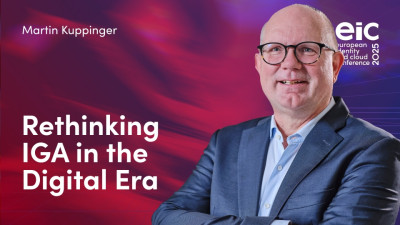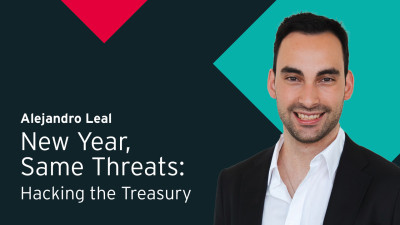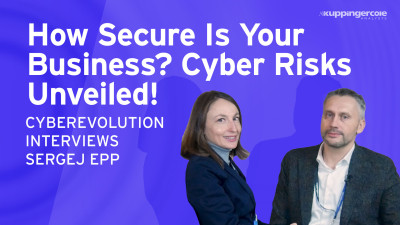A lot of wrong reasons to make it those wrong reasons are good at lower levels, but not for senior executive. So the first reasons will be to reduce cost. I am. Most of the time I am a very expensive project and you don't come back to your IOI could be security. So security is a, is a, of course the core of, of the IM, but for, for an exec business or a CEO, let's say there is a lot of other project insecurity saying that, okay, if you are not doing the project, we will all die. And it's difficult for him to choose between them. We have agility.
Also agility is core in the IM IM concept, but for an executive agility is to do project in one year and half results and one year for nine months or having ISS sooner. But it doesn't see really what is why he should invest hundred millionth there.
And I'm speaking about really business executive, not CIOs or technical people though.
In fact, those are the very standard reasons for, for IM, but they are too, too close of what is providing an IM far too close. And if you want to launch and to convince really at the highest level to launch a program, you need to connect to the global strategy of the organizations and to really make understand different executives, which value it will bring. But at larger scale, I will give you some examples based of course, on a, on Excel, about what has been the core point that we push for launching this program and how it has been received. And after that, how we are tracking them.
So, as I said, we are speaking about business strategy. So we need to understand the context and we need to understand what are the strategy for, for, for the company. AXA is a big company. We are second in term of insurance in term of revenue worldwide. We in eighties, in the eighties, we were approximately 2000. Now we are 120,000 peoples plus 60,000. If we're considering people working for us, us, but not employees. So big growth, very big growth, lot of acquisitions, lot of integrations.
And one of the first things that we push for for the identity was to explain that if we improve our identity, because our, as you can imagine, when we have such an increase and such a pace of acquisitions, you have a lot of silos. So if we improve our identity, we will reduce the time to integrate a new company or toss a new company.
And this makes sense because each month in acquisitions are counting in million euros or loss benefits.
So first point, not speaking so much about the agility, but speaking about what is the benefits ultimate benefits for, for a specific case in the business and super relevant for AXA second point. And by the way, the market of invest out of insurance business is small and local. There is a, we, we all heard about big ones in, in Iran, but in fact, the market is super distributed. So it'll continue. So it's very interesting for him because he's able to project and say, my am will support in the coming years. My acquisition strategy, second point, we are in a company, we are managing El data.
We are managing a lot of foods and we are in insurer. So we need to put aside every year, certain amount of money, which are that we are calling the operational risk.
And this is a key factor for the insurance business. And we are the stakeholders. The shareholders are following the amount of money that we are putting, and it's directly linked to our level of risk. One of those high risk is of, of course working security and everything that, so it works to really identify how much when I launch the IM how much issues I will remediate.
And at this moment how I translate that directly neuros, because if I improve my security, I will have less money to put aside every year for covering this risk. So he also, we connect directly to some things that a CEO can understand being heroes at the end that we can remove from, from your genre last point. And this one was the most important. The one really touch.
We are one of the few markets, which has not been disrupted by the digital.
When I say disrupted by the digital is that we don't have a Uber like interior or Airbnb insurers, Google tried to come, but they never really takes a little and become, you know, like it was the case with Salesforce or really disrupts the full market. So this is a risk that it'll it'll happen. Not yet. But the question is more about when now, and for that you have two options to, to avoid that and to help the first one is to become unavoidable. It's mean that you have so many partnerships everywhere that in fact there is no more room or less room. Let's say you have partnership with bank.
We have partnership with transport. We have car manufacturer with everyone.
This, the first strategy second is to become yourself a disrupter it's smaller, but it's to BES to create global product global platforms based on digital tools and become your own, your own competitors.
Of course, AXA wanted both. And they have once common point. Both of them have a common point, is that either in the first case or the second case, you need to collaborate. If you want to do partnerships, you need to be able to exchange data outside of your company. If you want to make global platforms, you need to extend data inside your company.
So out of all the silos, in all cases, you need to be simpler and open, which is not absolutely in oppositions. And we a previous point, which is we have health data and we are, we are hosting a lot of funds. So here is an interesting point that we were able to make a point a bridge between the and the two, this, this, this strategy and where it is interesting that it was not direct.
In fact, because you cannot say that identity put, improve your identity and the data will be exchanged like that.
And it'll be super easy. But for that, you will need to harmonize your business different process. You will need to maybe make put in place a data lake to share data. And there's, you need, you will need to have put in place a cloud to, to, or to put in place a unique network to remove the silos, both times identity and identity.
And each time that we wanted, you know, to make this global platform and global company declared global company each time at tournament, we have this blocking point, which wasn't identity. And by each time putting it in, in a, in a, in a, in evidence at the moment, it become hype and the success of choosing the battles and not going, you know, so all the different advantage of the identity or, or pushing to, to world everywhere made that this dry topic for an executive become hype.
And currently our group CEO know about the identity now in the tag, but you know, that it's linked to his strategy of platforming globalizations and we are becoming at arch one of the core program of the, of, of the group. And by extensions, one that could not be cut off. And it's super important because you can get the money, but at the moment, you need to keep it for, for finishing.
I, I show you some the Strat the Strat point, but in truth afterwards, when it's lunch, when the project is lunch, when you really got the money, when you have to acceptance, then you can come back to the initial KPI, which are my agility, my savings, my level of security and track this point, because of course, it's super hard to track in a day to day life. How much will you make gain on a merger and acquisitions, or how much you may gain for, for creating a platform?
So if you have to keep one thing in mind, there is two level to do a business case, one level for your top executive, especially if you amount of money, super high, which are not concerned by security or by your, by your it, but not in day to day life. So you need to onboard them with their real needs. And then you can come back to all the different that we heard during year, which are the security, agility, savings, and comfort for the employees. I give you the mic from the, how you can switch two slides will go directly into two slides.
It's already
Perfect.
And
Exactly, I know we have our goals. We have our fundings and let's dive into what we have done exactly and more processes what we are doing because the program is not over yet. And we have the first thing to, to look at is that we have built three main products, six, because third one is split into several products. And we address all the aspect of the identity. We go from storage and repository to access, access management through identity management.
And the reason to that is that once again, each part of this programs answer to the ultimate goals, which is enable collaboration for access management. It's straightforward. You want a seamless connection experience for your employee, for your partners. You also want to secure and to have trust into who is coming inside of you inside of your services. So you will build race based access, risk based access, etcetera.
We want also to accelerate the ability to deliver new projects and new services.
And that's why we are turning to self-service not only for employee and users, but also for developers with a Porwal to manage your own application inside or open connect. For example, the second topics is manage identity AXA build with is a group. So there is several entities, the maturity of each entities, very a lot. We have very much entities with strong EGA, and we have entity without almost nothing of who do everything manually, but more importantly, on the group level today, there is nothing because yesterday collaboration does not mean was not concerning the entity between them today.
It is one entity needs to work with another. And the manual process we had initially is not enough and is not speed enough to ensure the, and that's why we are building a new platform to manage a new IGA, to answer this particular need, and to be able to have a joiner move lever process at the I level less, but not least the identity storage or repository one point is to merge several repositories.
There's a lot of repositories that AXA can have due to the different accusation.
And we design four repository today for the users, for the administrator, of course, for security reasons, but also for the resources and for the public resources, everything which is, which is cloud. And the reason to have this central repository is also for collaboration, having one account for the user, between the entities and him to ate easily and more in more faster than before. It's the same for resources.
And for application, when you provide a provider service and want somebody from another entity, from a partner to come and to consume it services, it's easier if we have to manage groups and ICL in one active directory than if we have to build trust between directory and end up again, managing also ACL and group membership. So we gain time, we gain gain time, sorry.
And of course security, because it's very critical component and we have to monitor it and having a central one is monitoring. And so that whole, we answer the collabo need no today the program is still ongoing.
We are in the building phase. It's I haven't say at a good space, we meet some, okay, we meet some issues. We meet some bumping points, but basically it's okay. And the reason of that there is several, but we have three that we, we keep in mind. We want to present to you. The first one is don't mix up goals and means to reach them. Our goals is to enable collaboration. And with that in mind, it's enable us to make a good decision.
As I say, some of it is very mature. They have already strong EJ. We don't want to come to them saying, okay, you have to catch your to quit your AJ and come to us.
Because if we do that, we will destroy. In the best case scenario, we will throw money to the window because we will end up with the same level of services. But there is a great chance that we destroy value because we will not be able from day one with our new product, to have the same level of maturity on all the services available, due to JT and MVP, because we start from an MVP. Then they have built in the past 10 years.
So with that in mind, we are able to make savings and also to empower the entities. Two is not a project. It's a program. It's a big one, but what we want to do to say that we don't do identity to do identity. We do identity to support other programs and to help them to achieve the ultimate goal of AXA, which is collaboration.
It means that we work with the network program.
We work with the workplace program in order to ensure more trust, to enable the user to come easy, to use easily more easily, sorry, the, this programs, and to bring, prove not from the identity, but from the people using all these programs, to be able to work seamlessly and in the good condition. The last part is a little bit it's. The world is a little bit strong, but expertise may not be in your teams. We are a 10 people core team, I think with expertise in em, of course, but we are facing dozens of other anti working on that, on this film for years also. And they have good ideas.
Maybe sometimes they are the ones that have participating, participating into the writing of the standards we push on. And we have to listen to them, not for change management reason. As we can see in, since several years in this type of programs, we don't want them onboarded to train. We want them to drive the, with us to, to reach our goals. And of course, rely on market protocol and standards. That's an obvious one, but don't forget or scheme, etcetera is there are air for a good reason. I will let end this presentation with a few SW. Yeah.
Thank you very much. Roughly.
What is important is collaborations in our program with shoes between all the things that I thought you show you before, and it's really focus on the collaborations and make sure that now it'll be easier to collaborate in AXA and reach the strategic goals, collaborate everywhere around, make sure that because we cannot reach the real goal. It's not possible. If I have a poor network, a good identity with a poor network does make sense and collaborate with experts and collaborate with all the people that are working in the, in the, in the company. Just because they're better than us.
They are OUS. They're better. They know they are, they are local constraints. They already sometimes make this kind of project. So it's a win-win. Thank you very much. If there is some question.


















































